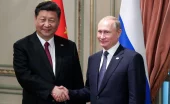So many memories, particularly of the years as neighbours on Rosemount Avenue, with shared activities, adventures and lively political discussions.…
Wednesday Night #1720
Written by Diana Thebaud Nicholson // February 18, 2015 // Wednesday Nights // Comments Off on Wednesday Night #1720
Despite a number of other important items, we expect Grexit [‘Grexit’ risks rise but compromise seen still possible] to dominate this Wednesday’s discussion, especially as Kimon Valaskakis will be with us. In anticipation, you may wish to read this piece to which Kimon has pointed us Fair debt relief for Greece: New calculations
The comment from Chatham House Senior Fellow Quentin Peel Fears of ‘Grexit’ Are Still Greatly Exaggerated bears examination in light of the most recent developments. At the end of January, he wrote: the reality is likely to be another hard-fought compromise between fiscal disciplinarians and debtors. Is this still true?
Tony Deutsch offers the following solution for the current apparent impasse:
There exists the intermediate solution of ‘parallel currencies’. The Bank of Greece issues notes called New Drachmas (ND) which it declares to be on par with the Euro. All domestic payments by the Government of Greece are made in ND. Taxes may be paid at the taxpayer’s option in Euros or ND. The Government does not intervene in the exchange rate, nor in the free flow of capital, does not violate EU or Euro rules. There is no formal Grexit, and there is no external constraint on domestic spending.
Gresham’s Law (bad money drives out good) begins to operate. Greeks will spend ND and hoard Euros, Euros will disappear from ordinary circulation in Greece. The government will terminate austerity measures by spending ND. On free markets, in and out of Greece, the ND will move to a discount against Euros, the domestic price of imported or exportable goods in Greece will rise. The real living standards of those receiving their incomes in ND will fall, but the Government can blame this on foreigners, and print more ND to provide inflation compensation to pensioners etc.
Please note that the Government did not do anything to leave the Eurozone. It is inflating its way out of its domestic problems. It will offer to pay off Euro denominated bondholders in ND at the “official” parity rate, to have the creditors settle for what they can get now, or spend years in the courts.
Of course Greek sovereign debt will be unmarketable for fifty years, and the government will have to shoot for a positive primary balance in ND, but meanwhile they are rid of their debt burden. Eventually they might wish to switch to yet another , newest, currency and start their game over.
Meanwhile, Mohamed El-Erian predicted “a Greek exit from the euro would cause ‘short-term chaos’ [in the market], but it would not bring the global economy to its knees. He expects short-term losses and a lot of volatility. “The reason it would not be a major catastrophe is because Europe has done a lot to navigate a Grexit.”
Nobody expected much from the latest Ukraine cease-fire talks and the collective pessimism regarding the Minsk agreement seems well grounded [Russian-Backed Rebels Claim To Capture Debaltseve, Key Ukrainian Town] The BBC reports that Russian President Vladimir Putin says he expected fighting to continue in parts of eastern Ukraine despite the signing of a ceasefire deal. But Mr Putin said there had been a “significant reduction” in the intensity of combat since the truce came into effect over the weekend. So now what? One indication: the UN Security Council has adopted a Russian-drafted resolution on the Ukraine crisis calling on all parties in eastern Ukraine to stop fighting and implement the European-brokered peace deal as the ceasefire rapidly began to unravel. Russia drafted the resolution, adopted unanimously by the 15-member council, in a move that US Ambassador to the UN, Samantha Power, described as “ironic.” (that was pretty restrained of her ) “The Minsk agreement must be fully complied with by all sides, said Russia’s Ambassador to the UN Vitaly Churkin. “We have to avoid adopting unilateral measures that would contradict the letter and spirit of the document signed in Minsk on February 12, 2015.” So, once again, the theatre of the absurd plays out on the world stage.
Mr. Putin is now in Hungary at the invitation of Victor Orban and according to reports has found a warm welcome. It’s all about gas, of course, as Russia is the country’s main supplier.
Tony Deutsch comments: on Putin’s warm reception in Hungary for his six-hour visit on Tuesday, which I could follow as closely on the internet as the government permitted the remaining independent press to cover it. On Monday, Putin’s armored Mercedes 600 was flown in by a heavy transport plane. This vehicle was used to whisk him about. The streets where he passed were emptied of cars and pedestrians, with sharp-shooters on the rooftops and two helicopters overhead. His contacts were limited to government officials, and a small number of obedient journalists from the official news agency and TV. The suspect article about the warm welcome has no corroborating evidence. There was a Russki Go Home demonstration permitted on Monday. Except for the suspect article, I have not seen any attendance estimate below 2000. During the Putin visit, far from where the President went in front of the Russian Embassy, there was a pro-Putin demonstration that the press was permitted to cover. Attendance was 30 to 50 persons. Those interviewed freely admitted that the attendees consisted of a mixture of unreconstructed communists and neo-nazis, which allowed one of the interviewees to claim that they represented the entire political spectrum of the population. (Russia supports neo-nazi groups and anti-EU leftists wherever they can find them in EU countries.) Putin, out of the range of the cameras, laid a wreath in a Russia military cemetery on a memorial dedicated to the Soviet soldiers who lost their lives in smashing the 1956 uprising.. Non-governmental commentators are still trying to find a reason for Putin’s visit, other than his being able to show that he is still being received by an EU-member government. Meanwhile, the new American Ambassador in Budapest gave a well-publicised lunch on Tuesday in honour of the Ukrainian Charge, with the Canadian Ambassador and other western diplomats in attendance, where the hostess clearly reiterated the US position on Ukraine.
ISIS/ISIL continues its horrific rampage. In the wake of the beheadings of the 21 Coptic Christians in Libya, Al Jazeera asks Is ISIL expanding its brand?. Expansion of ISIL’s activities into Libya not only brings Egypt into the action, but calls for international intervention in Libya – justifiable on the basis of ‘you broke it, you own it’. A propos ISIS, Kimon published an op-ed in the Gazette ISIS’s strategy remains seriously flawed that concludes “The best strategy against ISIS is for the Rest of the World to (a) defeat it militarily, and (b) deglamorize it by exposing its contradictions and burst its bubble with the help of the Rest of Islam.”
And Boko Haram intensifies its assaults on innocents, expanding into Niger and Chad. In the face of the Nigerian government’s helplessness (ineptitude) it is expected that a group of central African countries will launch a multinational force to fight the militant group. It’s not clear whether this force is the same one – or part of – the one promised by the African Union, but in any case it is essential to bear in mind the warnings raised in African Union forces may exacerbate Boko Haram threat
Brett House is the author of the report on last May’s Salzburg Global Seminar New Dynamics in Global Trade Architecture: WTO, G20 and Regional Trade Agreements, which has just been released. This important document is not light reading, but offers a concise synthesis of the discussions that reflected the growing concern at the WTO’s headquarters in Geneva and in global capitals with the state of multilateral trade processes; the discussion also show-cased how differently multilateral trade issues are viewed from diverse national and sectoral perspectives.
Oh, Canada
On Sunday, the 50th anniversary of the first raising of Canada’s Maple leaf flag was celebrated with minimalist enthusiasm by Mr. Harper’s government. As noted in several places, the government has allocated a mere $50,000 to celebrate the flag’s birthday – a banner first raised by a Liberal government, after all – compared to nearly $4-million to mark 200 years since the birth of Conservative prime minister Sir John A. Macdonald. And then, there is of course all of the enthusiasm heaped on commemorating the War of 1812.
In case you missed it in the traditional thundering quiet of Friday news, The Prime Minister’s eighth director of communications, Jason MacDonald, is quitting.
We were startled by Mr. Harper’s attack on Radio Canada Harper évoque une haine des valeurs conservatrices à Radio-Canada which appeared to come out of nowhere. Was it provoked by the airing of La droite religieuse au Canada last August?
Entre Québec, Ottawa, l’Alberta, Israël et la Cisjordanie, le film se penche sur cette face méconnue des conservateurs – nous emmenant à la rencontre de politiciens proches de Stephen Harper, de chrétiens évangéliques attendant le retour du Messie ainsi que de nombreux critiques qui s’inquiètent des conséquences des politiques actuelles sur les droits de la personne, les changements climatiques et la recherche scientifique au Canada.
Wednesday Nighters:
The past week has brought excellent news of several good friends of Wednesday Night in very different fields.
On Friday, at a major press conference, Paul Shrivastava was hailed as the global executive director of Future Earth, the initiative launched in 2012 at Rio+20.
And on Monday, Vice Media announced that Michael Kronish is to head up its $100 million mobile and web content studio and upcoming 24-hour VICE TV Network in Canada.
Monday also brought news of Robert Galbraith‘s victory in his one-man struggle to ensure that Ivanhoe does not proceed with excavation without due archeological process of what could be the site of important artefacts from the Hochelaga period of Montreal’s history . From being a lone and lonely voice, over night Rob turned into a media star, thanks to one article in the Globe & Mail Montreal office tower site may be an aboriginal burial ground.
Kyle Matthews continues to receive broad coverage for MIGS and the Digital Mass Atrocities Prevention Lab initiative, the latest being P.A. Sévigny’s very complete summary in The Metropolitain MIGS director set to fight online terrorism



